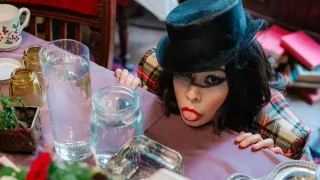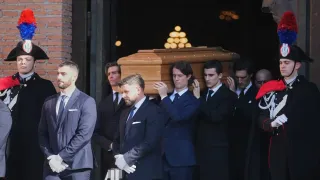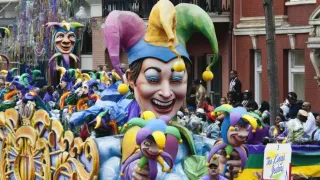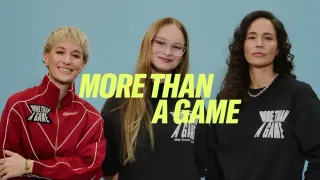December 3, 2018
It's a Wonderful Life
Ed Tapper READ TIME: 3 MIN.
One in a string of successful Hollywood films by Frank Capra, the 1946 "It's a Wonderful Life" has emerged as the director's masterpiece. Its sentimental humanism uplifted a generation which had suffered the hardships of the Great Depression, and the sincerity of the work continues to move and inspire today.
As the film is set on Christmas Eve, yearly viewings have become a holiday ritual. Those who do not own the classic on any home video format have the opportunity to enjoy the heartwarming saga of Everyman, George Bailey, in the Greater Boston Stage Company's nifty dramatic interpretation of the tale, which is playing at the Stoneham Theater through December 23.
The company's artistic Director, Weylin Symes, fashioned a lively, witty stage adaptation of Capra's iconic film, which succeeds in capturing the pathos of the work, while bringing to life the many colorful characters of the original screenplay. As one might expect of a live theatrical rendering, some liberties were taken, and comic touches were added, such as the Baileys giving birth to four children in the space of 30 seconds! In such a recreation, it is not necessary to slavishly imitate every aspect of the original but, hopefully, to convey the basic themes of the original. And GBSC's production certainly succeeds at that.
The vibrant, stage direction of Tonasia Jones and Tyler Rosati contributed greatly to the impact of the performance. Where a film includes countless scenes, sets and camera angles, a play is limited to a single viewpoint and space, in this case the rather limited confines of the Stoneham Theater stage. The co-directors were adept at keeping the action lively and fluid, while suggesting the various locations in the film with one basic set, and minimal props and design elements. For the many that know the movie version well, this was hardly a problem.
As the film showcased a large portion of the population of Bedford Falls, New York, it was necessary to draw upon the versatility of the GBSC troupe for this production. And the talented group rose to the occasion. Many of the actors played two or more characters, changing accents, and even sexes, at a moment's notice. Bob Mussett did a fine job as George's loveable, alcoholic Uncle Billy, played in the movie version by Thomas Mitchell. Lionel Barrymore was a tough act to follow as the conniving villain, Potter, but Margaret Ann Brady was terrific in the part; and displayed her remarkable range by doubling in the sympathetic role of George's mother.
Likewise, William Gardiner played a variety of key roles, and made an endearing angel, Clarence. As George's stalwart wife, Mary, Marge Dunn cut a lovely stage figure, and gave a very convincing interpretation of the role originally created by Donna Reed.
Stewart Evan Smith delivered a comprehensive and exuberant reading of the hero, George Bailey. Onstage for almost the entire two-hour running time, he was able to negotiate the complex stage direction, and the many abrupt changes in mood that the role required. However, he could not quite suggest the amiable and vulnerable aspects of the character. In all fairness, James Stewart is so masterful and perfectly cast as George, that it is impossible to approximate his characterization; although Smith certainly made the most of this highly challenging role.
In addition to this charming production of "It's a Wonderful Life," the Greater Boston Stage Company will be celebrating the holidays with "Tiny Tim's A Christmas Carol," offering performances scheduled right up until Christmas.
"It's a Wonderful Life" continues through December 23 at the Greater Boston Stage Company, 395 Main Street, Stoneham, MA. For more information, visit the Greater Boston Stage Company website.






